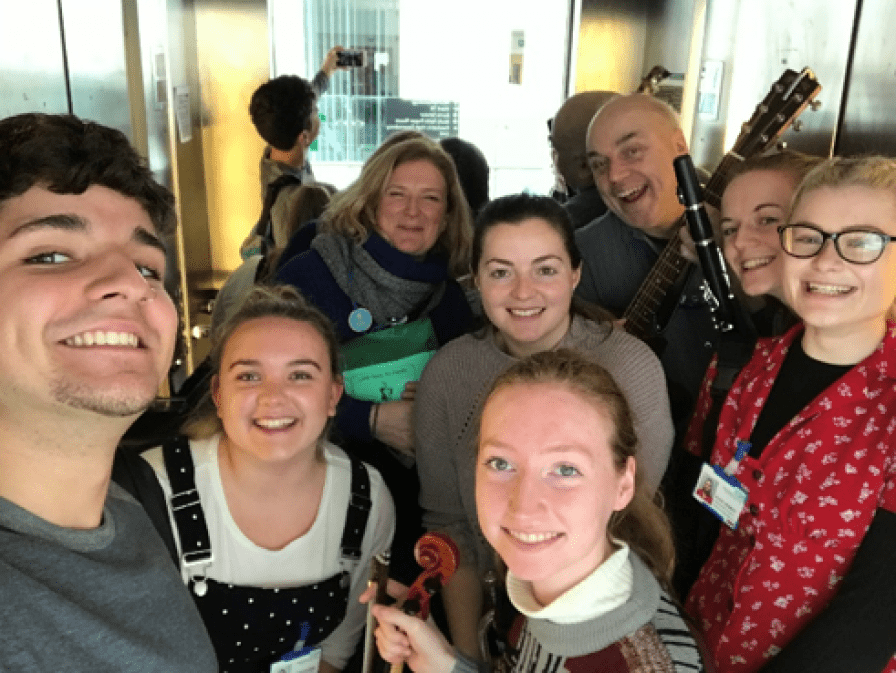“I felt the music was really making a difference in the lives of the children and their family…I feel more positive every time I leave the hospital.”

Songbirds Music for Health placement in partnership with the Royal Northern College of Music and The Royal Manchester Children’s Hospital
Every year we take approximately 10 undergraduate students on a music for health placement which takes music making into hospital ward spaces, bay areas, corridors and bedsides in the form of spontaneous musical interactions with children and young people in hospital.
Although we visit many children on several wards, some of our students join us in Songbirds music making sessions, a very special ward where children experiencing extreme challenges and complex health conditions are often residents for months at a time. These moments of meeting in music between us, our students, family members, nursing staff and children on this ward can be some of the most profound of any the students will experience during their time with us on placement.
During Songbirds sessions each child can freely display their unique personality through music making, whether a baby, young child or teenage girl. Many of the children delight in seeing new, fresh friendly faces when the students come with us; some enjoy the fun of being in a big group together, with new names to learn and new unexplored instruments to hear. Hospitalisation brings with it the challenges of isolation from family and friends. Music making programmes play a key role in reducing loneliness, social isolation and lack of creative stimulus whilst also increasing much needed opportunities for human interaction.
A typical session calls upon the students to draw on a range of performance and interactive skills: playing as an ensemble, improvising, taking lead and supporting roles, performing, composing and creating. Most importantly, the students learn to develop empathy – knowing how best to ‘be’ with children and young people who might not be able to tell you how they feel or what they would like to do – they discover how to build a connection with them in music. These are the most precious skills a musician working in hospital develops during their career - without these, the notes you play just don’t really matter.
Today during our Songbirds session, our students learned to be conducted by a child who moved his face to instruct them when to play; as the students gained more clarity in their playing, he challenged them more – moving his mouth from side to side, then up and down, lowering his chin. Then he wanted new sounds for scrunching up his face and moving his cheeks from side to side. For fast flourishes of sound, he wriggled and shook his head. There he was: the conductor of a rich sound ensemble all eagerly awaiting the next instruction, absorbed in this moment and oblivious to being on a hospital ward. The sounds in the music ran, swirled, jumped and tumbled – a true escape in more way than one for this child, who was totally in control and cleverly planning every sound he wanted from the students with delight.
In another session, a young patient showed us a drum machine she had been learning to play. Previously reticent to join in when we had met her the week before, today she played us a pattern, which became the beginning of a new composition we all played - saying nothing, but playing together, losing ourselves in the music for a short while; we could have been anywhere.
Her mum had earlier listened to us playing, aware that her daughter was not so outwardly sure of how to respond to the experience. After we had played, she found a quote in a book she was reading, Matt Haig’s How to Stop Time. The experience of music had made her think of it, and she flicked though pages until she found it. It told of a person reflecting on how experiencing music made them feel – how the music ‘got’ inside them, but how they realised after all that the music was always inside them, they just had to find the right way to find it. We talked about the beauty of music, how we can all be part of it, in any way we want. The students sat and listened as mum read the quote and as we talked. At that moment I could think of no better way to be studying music than to be part of that experience we were all having together. I wouldn’t change that for the world.
Our students bring their joy of music to our hospital music sessions. It can be a challenge too, so at times, they bring their apprehension, insecurities, questions and uncertainties. We hope that we can help them to develop and gain confidence in their music making and musical interaction skills and support them as they grow. But there is something more to learning that this experience offers: it is with these experiences that I believe our students truly grow - not only as musicians, but as human beings: musicians of tomorrow, with heart and compassion.
Ros Hawley – Songbirds Specialist Musician - 5/2/20
Hawley, R. (2013), ‘I am the Moon’. In Reaching Out: Music Education with ‘hard to reach children and young people.’pp.162-166, edited by Chris Harrison and Phil Mullen. UK: Music Mark. Hawley, R. (2014), Transferable Skills: Enhancing the Versatility of Tomorrow’s Music Educators. Music Mark Magazine. Issue 4: 3-5. Hawley, R. (2018), ‘Listen to a Songbird Sing: Musicians, Creativity and the Paediatric Hospital Setting’, International Journal of Community Music, 11:1, pp. 7–20, doi: 10.1386/ijcm.11.1.7_1 Robinson, K. (2017), Music in Healthcare Evidence Review, Youth Music.

